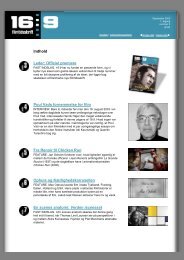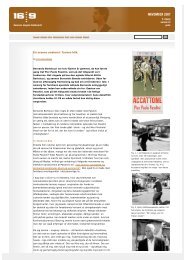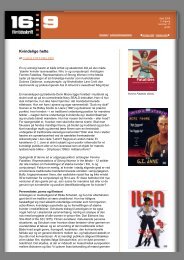You also want an ePaper? Increase the reach of your titles
YUMPU automatically turns print PDFs into web optimized ePapers that Google loves.
joke of my adult life in terms of my relationships with women. (Allen, 1983: 4)<br />
This "key joke" functions here as a self-diagnostic tool enabling our<br />
hero – as well as the viewer – to conceptualize a particular neurotic<br />
pattern in the life of a person who allows his feelings of unworthiness to<br />
prevent him from wanting any woman who would want him. This selfdiagnostic<br />
use of the joke is further developed in a subsequent scene in<br />
which Alvy Singer interrupts his love-making with Allison Portchnik, and<br />
succeeds in engaging her in a discussion of John F. Kennedy's<br />
assassination (fig. 3-4). When Allison says: "You're using this<br />
conspiracy theory as an excuse to avoid sex with me," Alvy replies:<br />
Oh, my God! (Then, to the camera) She's right! Why did I turn off Allison Portchnik?<br />
She was – she was beautiful. She was willing. She was real... intelligent. (Sighing)<br />
Is it the old Groucho Marx joke? That – that I – I just don't wanna belong to any<br />
club that would have <strong>som</strong>eone like me for a member? (Allen, 1983: 22-23)<br />
As already seen, Alvy attributed this joke to Sigmund Freud's Wit and<br />
its Relation to the Unconscious (1905). Actually, neither the joke itself<br />
nor any likely forerunner appears in that book. Alvy's creator was<br />
probably thinking of a joke which had appeared in Theodor Reik's<br />
Jewish Wit in the following form (2):<br />
Every day in a coffee house, two Jews sit and play cards. One day they quarrel and<br />
Moritz furiously shouts at his friend: "What kind of a guy can you be if you sit down<br />
every evening playing cards with a fellow who sits down to play cards with a guy<br />
like you!" (Reik, 1962: 57-8)<br />
Alvy's confusion of Reik's book with Freud's, takes nothing away from<br />
Woody Allen's brilliant use of the joke in Annie Hall.<br />
Virtually nothing has been written about the "Resignation Joke" in the<br />
literature on Groucho Marx. This is surprising, considering the notoriety<br />
enjoyed by the joke, especially since interest in it was revived by<br />
Woody Allen in 1977. Furthermore, none of the commentators who<br />
discuss the joke at all – Sheekman (3), McCaffrey (4), Wilson (5) and<br />
Arce (6) – raise the question as to why Groucho sent the famous<br />
telegram and what purpose it was intended to fulfill. The situation in<br />
which the telegram was sent will now be reconstructed, after which the<br />
original function of the "Resignation Joke" will be described, and an<br />
attempt will be made to account for its effectiveness in fulfilling that<br />
intended function.<br />
The Friar's Club Incident<br />
We have two sources of information concerning the context in which<br />
Groucho Marx first used the "Resignation Joke." The earlier of these<br />
sources is the biography written by the comedian's son, Arthur Marx,<br />
who provided the following account:<br />
[The actor, Georgie] Jessel has always been able to make Father laugh, and as a<br />
favor to him, he joined the Hollywood chapter of the Friar's Club a couple of years<br />
ago. But Father doesn't like club life, and, after a few months, he dropped out. The<br />
Friars were disappointed over losing him, and wanted to know why he was<br />
resigning. They weren't satisfied with his original explanation – that he just didn't<br />
have time to participate in the club's activities. He must have another, more valid<br />
reason, they felt.<br />
"I do have another reason," he wrote back promptly. "I didn't want to tell you, but<br />
since you've forced the issue, I just don't want to belong to any club that would<br />
have me as a member." (A. Marx, 1954: 45)<br />
Since this biography appeared in 1954, "a couple of years ago" would<br />
place the incident <strong>som</strong>ewhere in the vicinity of 1950-1952, assuming<br />
that a year or two may have elapsed between the writing and the<br />
publication of the book.<br />
The other account we have was written by the comedian himself in the<br />
autobiography that was published in 1959. Much unpleasantness had<br />
apparently been omitted from the earlier record, perhaps out of<br />
discretion, in order to avoid offending anyone, or because any public<br />
criticism leveled at the club had to come from Groucho himself, and not<br />
his son. And even here, Groucho took the precaution of withholding the<br />
name of the club, which appears under the same alias ("Delaney") that<br />
is jokingly applied to a number of parties portrayed in the<br />
autobiography in an unfavorable light.<br />
Groucho begins by telling of his general aversion for clubs, and this is<br />
consistent with the earlier description in his son's book, though here<br />
Fig. 3. "You're using this conspiracy theory<br />
as an excuse to avoid sex with me."<br />
Fig. 4. “Is it the old Groucho Marx joke?”<br />
(2) For the publication history of this joke,<br />
see Life Is Like a Glass of Tea: Studies of<br />
Classic Jewish Jokes (Aarhus: Aarhus<br />
University Press, 1992), pp. 189-190.<br />
(3) In his introduction to The Groucho<br />
Letters (New York: Simon & Schuster,<br />
1967), Arthur Sheekman wrote of the joke:<br />
"There, in a few satirical words, is one of<br />
the most astute and revealing observations<br />
about the self-hating, socially ambitious<br />
human animal" (p. 8).<br />
(4) For Donald W. McCaffrey, the joke was<br />
a non sequitur, resulting from "a chain<br />
reaction of delightful pseudo-logic that<br />
almost sounded valid." The Golden Age of<br />
Sound Comedy (South Brunswick and New<br />
York: Barnes, 1973), p. 74.<br />
(5) Christopher Wilson described the<br />
"Resignation Joke" as an example of<br />
shared ridicule, through which "the joker<br />
derides himself and his audience<br />
simultaneously [...] The message of shared<br />
disparagement being–'If you don't mind<br />
me, you've got no taste!'" Wilson was also<br />
the first to identify the joke as "a variant of<br />
the famous Jewish joke–'What sort of a<br />
shmuck do you think I am? I'm not going<br />
to sit down and play cards with the sort of<br />
shmuck who'd sit down and play cards with<br />
me." Jokes: Form, Content, Use and<br />
Function (London: Academic Press, 1978),<br />
p. 190.<br />
(6) In his introduction to The Groucho Phile<br />
(London: W. H. Allen, 1978), Hector Arce<br />
was the first to set the telegram in its<br />
social context: Referring to the Friar's Club<br />
of Beverly Hills, Arce wrote that Groucho<br />
"had <strong>som</strong>e misgivings about the quality of<br />
the members, doubts which were verified a<br />
few years later when an infamous cardcheating<br />
scandal erupted there. When he<br />
decided to drop out of the group, he wrote:<br />
'Gentlemen: Please accept my resignation.<br />
I don't care to belong to any social<br />
organisation that will accept me as a<br />
member'" (p. xv).
















